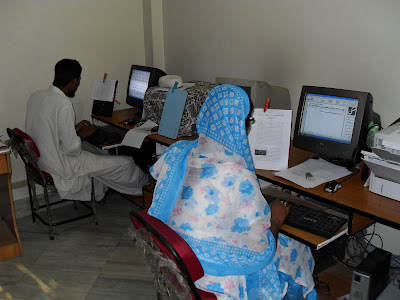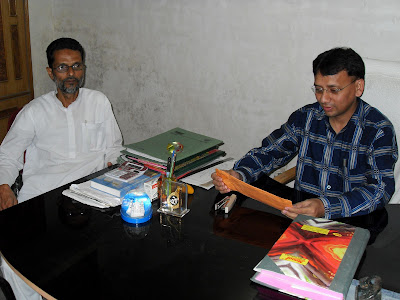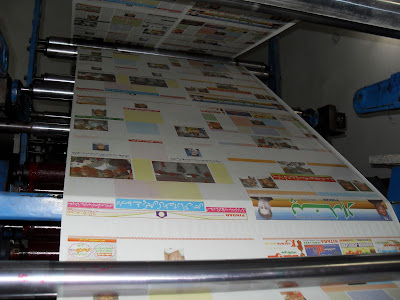By Manzar Bilal and Mudassir Rizwan, TwoCircles.net,
To solve problems facing Urdu Language in Bihar pressure groups should emerge once again like the ones that ensured it second official language status in the state, says Rehan Ghani, Managing Editor, Pindar, one of the oldest Urdu dailies in Bihar. Concerned with the Urdu speakers’ apathy towards the language, Ghani, also Associate Editor, Door Darshan, Patna, holds Urduwalas more responsible than the government for the sordid state of the language.
What are the difficulties and challenges before Urdu language in the country especially in Bihar?
Urdu language faces lots of difficulties and challenges from two sides: from the government and from the speakers of the language. Today a big problem is that we (Urdu speakers) have thrown out Urdu from our houses. Though we organize seminars and mushayera in metro cities we are not giving attention to the basic education of Urdu language. So, when the basic education of the language will stop then needless to say about its higher education.
There is a need for Urdu speakers to be aware of the problems and interests of the language. And they should think to solve its problems and protect its interests.
As for the difficulties from the government side, we cannot blame the government much because all the governments take decision when they are pressurized. For example, in Bihar Urdu is second official language but it got the status after much sacrifice of the community. Our forefathers sacrificed for it, they made a pressure group and put the demands before the government and also they made it an election issue until the government believed that Urdu speaking people became awake and if their demands were not fulfilled, the government would bear the political losses. Only then it accepted their demand and Urdu became second official language.
Today though Urdu language is facing problems from government but most of the problems are from our own side because we are not serious to solve the problems. Once again there is a need to make a pressure group only then the problems of the language will be solved both in Bihar and in the country. Therefore, I think that Urdu speakers and Urdu newspapers are themselves responsible for all the problems of Urdu.

What should be done to solve the problems?
The proprietors and editors of Urdu newspapers and well-wishers of the language from mainstream sections should sit together to point out the problems and see which problems we can solve and which ones can be solved by government. Then we should make a pressure group which would put pressure on government time to time. Actually most of the problems do not reach the government. Therefore, there is a need of a group which would make government aware about the problems of Urdu and also suggest the government ways to solve them.
Is it true that Urdu newspapers publish old news?
It is not true at all. Maybe this was happening 20 years back but in this age of internet, information and technology it is totally wrong to say that Urdu newspapers publish old news because today Urdu newspapers are as much updated as English and Hindi newspapers.
What is the circulation of Pindar?
(Smiling) when any one asks me about circulation of newspaper, I reply: do not ask any man about his salary and any woman about her age because they will never say truth about that. Similar is the case with newspapers. I am not proprietor therefore I cannot give you exact numbers. Yes, Pindar is in circulation and people of different parts of Bihar like it.

When did you join Pindar?
I joined ‘Pindar’ as Editor in 2004 when its proprietor decided to revive it. It is one of the oldest Urdu newspapers in Bihar but it was not in circulation for long. Soon after joining it I took several steps for its development. It is progressing day by day and now it is available in all parts of Bihar.
How will you assess the progress of Pindar in the last five years under your editorship?
Pindar progressed in terms of colour as well as number of pages. Earlier it was published in black and white and had 6 pages but now it is being published colours with 8 pages. Therefore people like it and its circulation is increasing day by day. But as a whole number of Urdu readers is decreasing which is the matter of concern for Urdu speaking people. The efforts which should be done to create awareness among people towards Urdu and Urdu newspapers are not going on so far. English or Hindi newspapers are using lots of means to attract people but Urdu newspapers are far behind in this regard.
What should be done for that?
Firstly, Urdu newspapers should increase their pages because English and Hindi newspapers have 20-28 pages but Urdu newspapers have hardly 6-12 pages which also contain advertisement then obviously we carry less material. Secondly, there should be columns for different topics. For example, the news from different parts of the country should be published separately. Similarly news about youths, women, job and economy should also be given specific spaces. Though I work with Pindar but in this regard I appreciate Roznama Rashtriya Sahara because it understood the need of the time. Therefore, it has more pages and every page for different issues. It carries news of almost all parts of Bihar. It brought out a revolution in the state Urdu journalism which created a competitive environment among the Urdu newspapers that surely benefited Urdu and Urdu journalism.

Did Roznama Rashtriya Sahara affect the readership of Pindar?
No. As a whole it did not affect Pindar because it has its own readers. It means that Pindar has been trying to build a good society because being Muslims we have some responsibilities about our religion and society. Therefore we do not carry nude pictures. We concentrate on carrying articles which may help to reform the society. We do not highlight the news of crimes and any such thing which may send a wrong message to the society because we believe that newspaper is one of the means to build good society and we will be asked about that. Because of these qualities Pindar has hold its place among a section of people.
How does government help Urdu newspapers?
In Bihar government helps Urdu newspapers more than in any other state. All those Urdu newspapers that are recognized by state government receive government advertisements and nowadays it is more compared to past. But on the other hand it is tragedy for Urdu journalism in Bihar that its working journalists are living miserable life.
Who can play an important role to solve the problems of Urdu newspapers?
The roles of government, proprietors, wealthy people and common readers of Urdu newspapers are required to solve the problems of Urdu newspapers and problems will not be solved unless all of them perform their roles sincerely. I want to explain here one thing that in Bihar proprietors of the newspapers are generally editors also, it does not matter that he is journalist or not. But a daily newspaper named ‘Inqilab-e-Jadeed, published from Patna, changed this tradition and its owner appointed a working journalist as its editor. Following this step Pindar also did the same. Its owner honoured me by appointing me as chief editor of the daily but because of a controversial write-up of mine I was dismissed from that post. Currently I am managing editor of the daily.

Is the new generation going away from Urdu language?
Yes, the new generation is turning away from the language. But they are not responsible for that; rather we parents are responsible for this because we are getting materialistic and have forgot our responsibilities about our language, our culture and our identity. Of course, we should make efforts for our necessities but should also be careful about our culture and identity.
What is your message for Urdu speaking people?
I request youths that as they are learning science and technology etc. they should spend at least one hour out of 24 hours to learn their mother language because it is their responsibility to protect it and make all efforts for its development and if they will not understand this language, then how they can fight for its right? Therefore, they should try to understand the problems of Urdu because people who are fighting for the betterment of Urdu today they will not be in future and new generation will have to counter these problems. Parents should also teach their children Urdu and keep Urdu books and newspapers in their houses. Unfortunately today there are many houses of Urdu speaking people where Hindi and English newspapers are available but not Urdu newspaper. People should understand the fact that Urdu language is essential to protect our Islamic culture and identity and if Urdu language disappears we will lose our civilization and identity.
(About the interviewee (editor): Rehan Ghani started his journalism career with Urdu daily Sangam’ published from Patna under the editorship of late Ghulam Sarvar, ex-minister of Bihar. He also worked with ‘Qaumi Awaz’ another daily from Patna. Then he was appointed as Urdu translator in the state department of Rajbhasha and worked there for only two years as he felt that though he was appointed as Urdu translator he was working as a clerk and nothing related to Urdu language. He resigned and came back to Qaumi Awaz. He spent around six months with ‘Urdu Samachar’ in Nagpur. Then he joined Door Darshan, Patna, as associate editor and is continuing till date. He joined Pindar as editor in 2004.)
